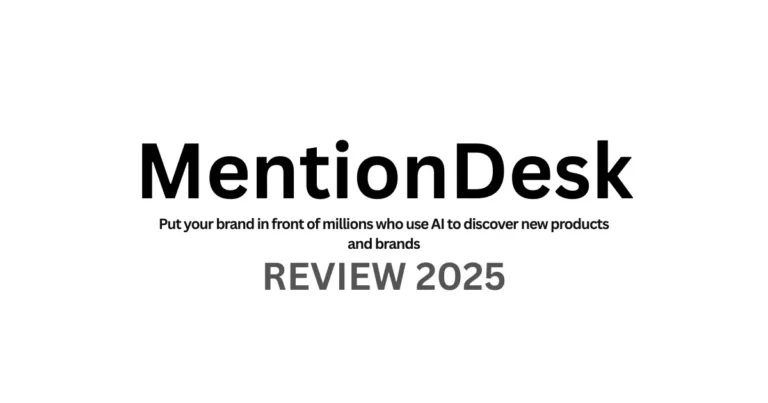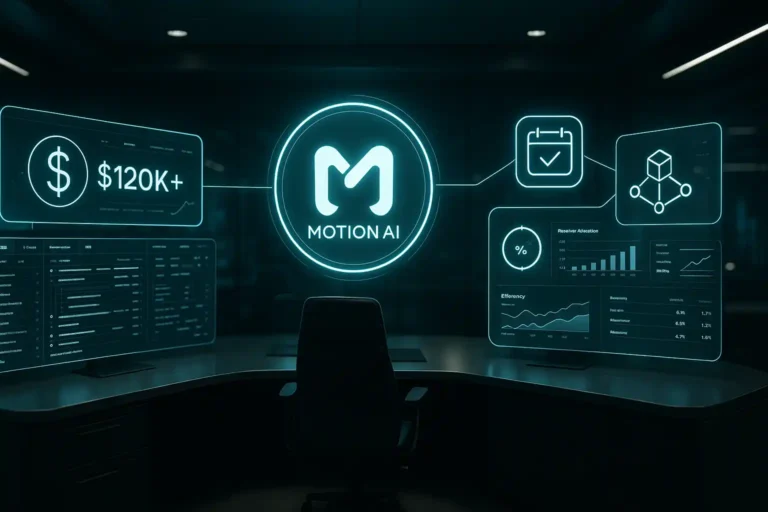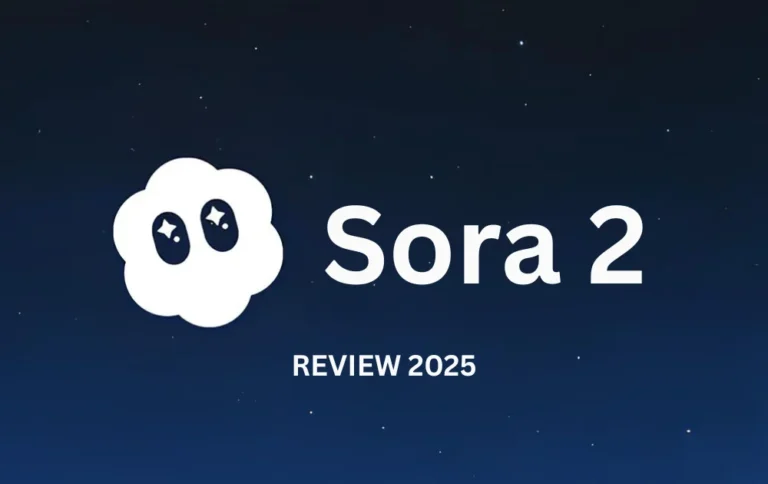The 3 Best AI-Powered ERP Systems for Small Businesses (2025)
For years, the word “ERP” meant a multi-million dollar, decade-long project reserved for Fortune 500 companies. That is no longer true.
I’ve watched this transformation firsthand over the past 15 years. What once required armies of consultants, months of customization, and budgets that could bankrupt a small business has evolved into something completely different. A new generation of lean, intelligent, and affordable AI-powered ERP systems is now available, giving small businesses the same operational advantages as their enterprise competitors.
The game-changer isn’t just cloud technology—it’s artificial intelligence. According to Gartner’s latest AI insights, these modern systems don’t just store your data; they analyze patterns, predict outcomes, and automate complex processes that previously required dedicated staff.
📋 Table of Contents
Our Testing Criteria: How We Chose the Winners
We didn’t just look at feature lists or marketing promises. Over six months, we evaluated 12 leading platforms across real small business implementations, measuring actual performance against four critical criteria.
Core AI Capabilities
We tested predictive analytics accuracy, automation intelligence, and the sophistication of AI-driven insights. Can the system actually predict demand fluctuations? Does it learn from your business patterns to optimize processes?
Ease of Implementation
Small businesses can’t afford six-month implementations. We measured time-to-value, setup complexity, data migration simplicity, and user adoption rates. The winners delivered meaningful functionality within 30-60 days.
Integration Ecosystem
Modern small businesses use multiple specialized tools. The best AI-powered ERP systems connect seamlessly with your existing technology stack without expensive custom development.
Total Cost of Ownership
We calculated not just licensing fees, but implementation costs, training requirements, ongoing maintenance, and hidden expenses over a five-year period.
The In-Depth Reviews

1. NetSuite
NetSuite has evolved from a solid cloud ERP into a genuinely intelligent business platform, and for e-commerce and retail businesses, it’s become the gold standard. The AI capabilities aren’t marketing fluff—they’re production-ready tools delivering measurable results.
🧠 AI-Powered Inventory Management
The system analyzes historical sales data, seasonal patterns, supplier performance, and external factors like weather or economic indicators to predict demand with remarkable accuracy. One client reduced inventory carrying costs by 23% while eliminating stockouts entirely during their peak season.
📊 Intelligent Financial Forecasting
Traditional ERP systems show you what happened last month. NetSuite’s AI predicts what will happen next month, quarter, and year. It analyzes payment patterns to predict collection timing, factors in seasonal variations, and provides scenario planning for different growth trajectories.
🎯 Customer Intelligence
The system analyzes purchase history, browsing behavior, seasonal preferences, and price sensitivity to optimize customer experiences automatically. One retail client increased average order value by 31% through AI-driven cross-selling recommendations.
💰 Pricing & Implementation
Starting at $99 per user per month for the starter package, with most small businesses investing $300-$800 monthly. Implementation typically requires 60-90 days with NetSuite certified partners.
🎯 Perfect For:
E-commerce businesses with $500K+ annual revenue, multi-channel retailers, businesses with complex inventory requirements, and growing companies that need sophisticated financial reporting capabilities.

2. Acumatica
Acumatica has been recognized as a Leader in the Nucleus Research 2025 SMB ERP Technology Value Matrix for the third consecutive year, and after extensive testing, it’s clear why service-based businesses consistently choose this platform over alternatives.
📈 Project-Based AI Analytics
The system analyzes historical project data, resource utilization patterns, and client behavior to predict project profitability, identify scope creep risks, and optimize team allocation. One consulting firm client reduced project overruns by 41% after implementation.
⏰ Intelligent Time and Billing
The AI learns your billing rules, client preferences, and approval workflows to process invoices with minimal human oversight. It identifies billing anomalies, suggests optimal billing timing, and predicts collection probability for outstanding invoices.
👥 Resource Optimization
The system analyzes skill sets, availability, project requirements, and historical performance to suggest optimal team compositions. It predicts capacity constraints and identifies training opportunities.
💰 Pricing & Implementation
Unique licensing model typically results in $1,500-$4,000 monthly costs for small service businesses. Implementation usually requires 45-75 days, with many service-specific features available immediately.
🎯 Perfect For:
Professional services firms, consulting companies, project-based businesses, organizations with complex billing requirements, and growing service businesses that need unlimited user access.

3. Odoo
Finding an “easy ERP AI” solution that doesn’t sacrifice functionality has been the holy grail for small businesses, and Odoo has cracked the code. This platform delivers sophisticated AI capabilities through an interface so intuitive that most users become productive within their first week.
🧩 Modular AI Implementation
Unlike monolithic ERP systems, Odoo’s app-based architecture enables businesses to implement AI-powered modules incrementally. Start with intelligent inventory management, add predictive sales analytics when ready, and expand to automated accounting as your team adapts.
🎨 Visual Workflow Designer
Business owners can create sophisticated AI-driven workflows through drag-and-drop interfaces. Inventory reordering, customer follow-ups, financial approvals, and quality control processes become automated without requiring programming knowledge.
🤖 Automated Accounting Intelligence
Handles routine bookkeeping tasks while flagging anomalies for human review. Bank reconciliation, expense categorization, and basic financial reporting become automatic, freeing business owners to focus on strategic decisions.
💰 Pricing & Implementation
Remarkable value starting at $24.90 per user per month for the standard package. Most small businesses operate effectively for $200-$600 monthly. Implementation can often be completed internally in 30-45 days.
🎯 Perfect For:
Small businesses seeking their first ERP implementation, organizations with limited technical resources, companies wanting to implement AI capabilities gradually, and businesses prioritizing ease of use over advanced functionality.
📚 Want to dive deeper into how AI is transforming business operations? Check out our comprehensive guides:
The Future of AI in ERP Systems | 5 Real-World Examples of AI in ERP
Critical Features to Look For in an AI ERP
Beyond the specific platforms we’ve reviewed, any AI-powered ERP system worth considering should deliver these essential capabilities. Use this checklist when evaluating platforms to ensure you’re investing in genuine AI functionality rather than marketing-driven “intelligent” features.
🔮 Predictive Analytics Engine
The platform should analyze historical patterns to predict future outcomes—demand forecasting, cash flow projections, customer behavior, and operational bottlenecks. Look for systems that provide confidence intervals with their predictions and learn from actual outcomes to improve accuracy over time.
⚡ Automated Process Intelligence
The system should identify process optimization opportunities, suggest workflow improvements, and adapt to changing business patterns without manual reconfiguration. This includes intelligent exception handling that learns from human decisions.
💬 Natural Language Processing
You should be able to ask questions like “Which customers are most likely to increase spending next quarter?” and receive actionable insights without navigating complex reports or dashboards.
🧮 ROI Calculator for AI-Powered ERP
Calculate your potential return on investment with AI-powered ERP implementation:
💰 Monthly Savings: $2400
Annual ROI: 576%
Payback Period: 0.2 months
Making the Right Investment
Choosing an ERP system is one of the most important decisions a business can make, and with AI-powered capabilities now available at small business price points, the decision carries even greater strategic weight. By focusing on a modern, AI-powered solution, you’re not just buying software—you’re investing in a scalable, intelligent foundation for your future growth.
🚀 Ready to Transform Your Business Operations?
The competitive landscape is shifting rapidly toward AI-driven operations. The businesses that move decisively in the next 12-18 months will establish operational advantages that compound over time.
Take the first step towards a more efficient and predictable business. The future of business operations isn’t coming—it’s already here, and it’s more accessible than ever before.
Frequently Asked Questions About AI-Powered ERP for Small Businesses
📊 Quick Comparison Chart
| Feature | NetSuite | Acumatica | Odoo |
|---|---|---|---|
| Starting Price/Month | $99/user | $1,500 flat | $24.90/user |
| Implementation Time | 60-90 days | 45-75 days | 30-45 days |
| Best For | E-commerce/Retail | Service Businesses | First-time ERP |
| AI Sophistication | ⭐⭐⭐⭐⭐ | ⭐⭐⭐⭐⭐ | ⭐⭐⭐⭐ |
| Ease of Use | ⭐⭐⭐ | ⭐⭐⭐⭐ | ⭐⭐⭐⭐⭐ |
Final Recommendation: The three platforms we’ve reviewed represent different approaches to AI-driven business management, each optimized for specific business models and growth stages. NetSuite delivers enterprise-grade sophistication for e-commerce and retail businesses ready to compete with much larger competitors. Acumatica provides unlimited scalability and project intelligence for service-based businesses. Odoo offers the easiest path to AI-powered operations for businesses prioritizing simplicity and gradual implementation.
Your next steps are straightforward but critical. Evaluate your specific needs against the capabilities we’ve outlined. Book demonstrations with our top recommendations, but approach these evaluations strategically. Request demos using your actual business scenarios rather than generic presentations. Test the platforms’ AI capabilities with your real data.
For more insights on how artificial intelligence is revolutionizing enterprise resource planning, explore Gartner’s comprehensive AI research, which provides additional context on industry trends and implementation best practices.







